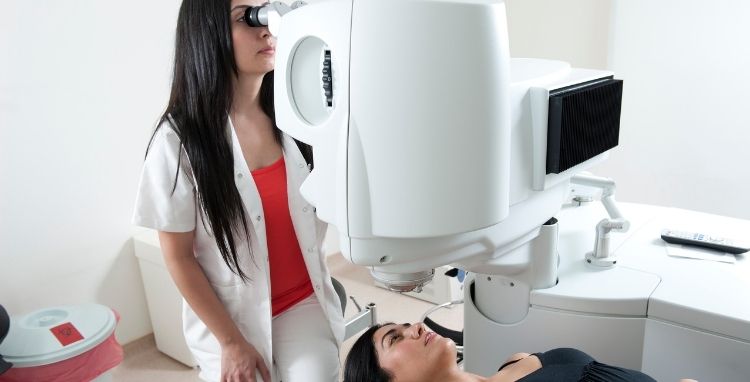Since the inception of LASER eye surgery, it is regarded as life-changing and revolutionary for several patients. Alike another surgical process it also has some potential risks associated with it. You can minimize and eliminate the chance as well. The best way to do so is to consult with a good eye surgeon for the procedure.
You must check that the surgeon has an impressive track record. Even the surgeon who will carry out the surgery must conduct the necessary test during consultation. Even the clinic should have the necessary technology for the procedure along with trained staff to ensure proper care till your recover fully.
List of some potential side effects of Laser Eye Surgery and how you can control them.
Dry eye
Followed by LASER eye surgery, dry eye is a typical temporary issue that has the ability to become long-term as well if proper evaluation is not done. Often after PRK and LASIK, patients experience this problem because the endings of superficial nerves require time to heal and regenerate. Due to the numbness and lack of sensation in the cornea, it can’t trigger the production of tears.
Moreover, nerve endings will generate cytokines (chemical messengers) to interact within the surface cells to promote growth. Regeneration of nerves will take 6-12 weeks and hence eyes will tend to dryness. But if the problem persists for a long period of time then there might be some serious issue that needs adequate attention and treatment.
Symptoms:
- Pain
- Fluctuating vision
- Burning
- Grittiness
Avoidance:
- Ensure that before the surgery dry eye test is conducted- TBUT (Tear Break-Up Time) and Schirmer’s test for tear production. Check that the surgeon is really knowledgeable and experienced person especially regarding dry eye.
- Ask the surgeon to check if there is Meibomian Gland Disease. The glands are present in eyelids secreting vital oils that resist the tear from evaporation at a fast rate.
- Before the surgery take re-esterified Omega 3 supplements for enhancing the function of the Meibomian gland
- Preservative eye drops must be taken frequently once the process is over
- Once every 20 minutes take a break from the computer screen. Close your eyes for 20-second and look outside for more than 20-sec before you jump back into work again.
Glare and halos
Every patient experiences halo a few days after undergoing LASER eye surgery (both surface ablation and LASIK). It is so; because fluid within the treated cornea enables scattering of light. Once it clears, the halos will subside. There is a risk to get permanent halos as well by the patients.
They experience terribly bad, especially at night. The induced aberrations due to laser that served to the corrected zone or non-Aspheric traditional form resulted in this problem. But it is rarely found in the customized treatment offers to the patient incorrect manner. It mainly happens if the procedure is not done up to the mark.
Avoidance:
- Make sure that size of the pupil is taken in dark/dim light.
- Make sure that surgeon has a good grasp on LASER eye surgery and understands higher-order aberration significance perfectly.
- Inquire from the surgeon if you are going to have aspheric treatment for the cornea. Every good quality spectacles and cameras possess this lens for better picture and vision. Be sure that your cornea is going to make aspheric.
- Check if the clinic has advanced and well-maintained laser technology or not.
Infection
Alike in all other surgeries, LASER eye surgery also possesses a pale infection risk. The order of lowest to highest infection risk is LASER, IntraLASIK, blade-LASIK, PRK, and LASEK. IntraLASIK possesses a below 1% chance of risk.
Avoidance:
- Always choose to visit a popular eye clinic that has a fantastic CQC (Care Quality Commission) rating.
- Inquire if air HEPA filtered environment is used or not for carrying out the procedure.
- Also, ask about the antibiotics used before and during the operation. Basically, fourth-generation fluoroquinolone like Gatifloxacin or Moxifloxacin is used. These are strong antibiotics and can eradicate an array of bacteria.
Ectasia
This condition is represented to the problem in which cornea becomes extremely elastic making the surgery unsuitable and unstable. As a result, it thins and bulges over time. This fluctuation makes you put on the glasses to see the objects clearly. It raises the chance of developing astigmatism.
It can happen after undergoing either the PRK/LASEK or LASIK surgery. Some tell-tale signs are cornea is easy to pick up by corneal epithelial thickness mapping, biomechanic checks, and sophisticated corneal mapping.
Avoidance:
- Only the surgeon especially the cornea specialist can determine if you have the chance to develop this issue. They are particularly trained in Keratoconus referring to bulging and elasticity in the cornea. Certain similar tests are done to figure out the occurrence of this condition as well.
- Investigate if they use 3-dimensional tomography devices such as Pentacam to assess the cornea extensively.
- Whether they use biomechanical checks for the determination of corneal elasticity.
Flap complications
Several flap complications like abnormal fragmented flaps, partial flaps, and buttonholes get reported due to the use of blade microkeratome to make the flap. Thankfully, now flap complication becomes rare due to the inception of IntraLase femtosecond laser to make the flap.
It is introduced by the Centre for Sight to the UK in 2004. Now the bladed microkeratome is of no use and femtosecond laser is regarded as the gold standard to make it.
Avoidance:
- Inquire from the eye center if they will use an Intralase laser to make a corneal flap for LASIK surgery.
- Ask the surgeon how the LASIK is performed and when they are using IntraLASER.
With the introduction, LASER eye surgery becomes an outstanding option to fix your vision problem. Of course, you have to make the correct choice. So, it is important to be well educated regarding the procedure.
Then you have to put effort to look for a reliable and experienced eye care clinic and surgeon respectively to obtain phenomenal care. Always choose the clinic where eye surgeons used to visit for their individual visual care.












